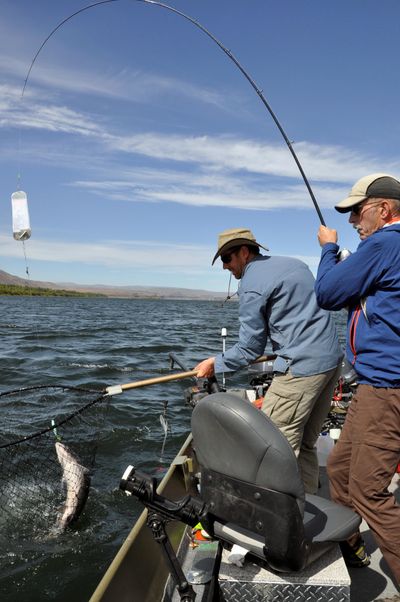Sportsmen to be asked to pay higher fees

Salmon and steelhead anglers in the Columbia River would pay 69 percent more in fees under the Washington Department of Fish and Wildlife’s final hunting and fishing license increase proposals for 2017-19.
The license fee package submitted to the Office of Financial Management in September would increase the annual cost to fish for salmon and steelhead in the Columbia River from a current $38.25 to $64.75.
Under the proposals, an annual freshwater fishing license would increase from $29.50 to $35 and the Columbia River endorsement would increase from $8.75 to $9.75.
Now-free catch record cards would be $10 for salmon, $10 for steelhead. Those $10 amounts have been scaled back from the initial proposal of $17 for each.
Approval by the state Legislature and governor are required for the fees to increase.
“We’ve heard from thousands of Washingtonians about their priorities for recreation and conservation,” said Jim Unsworth, department director. “They couldn’t be clearer: They want to preserve and expand fishing, hunting, and other outdoor opportunities, and they’re not interested in paying more to get less.”
But agency’s operating costs are increasing.
“We face tougher and more expensive federal requirements for hatchery operations, salmon and steelhead recovery, and other endangered species programs,” Unsworth said. “Emerging challenges such as elk hoof disease are also consuming more time and money. There’s no getting around it: New funds are required.”
The proposed fee increases come at a difficult time for the agency.
Both the Washington and Oregon fish and wildlife commissions are deliberating on whether to implement fully a plan adopted in 2013 to prioritize sport fishing in the Columbia River and move gillnetting to off-channel areas.
Commercial fishermen are advocating a delay in full implementation in 2017.
A decision is expected from both commissions in mid- to late January.
Federal fishery officials also are proposing changes to the operation of many lower Columbia River hatcheries, including a moderate reduction in fall chinook releases.
The Northwest Sportfishing Industry Association has yet to take a position on the proposed fee increases, said Liz Hamilton, executive director.
“We know the agency needs more money,” Hamilton said. ”There’s no doubt about that.”
However there are several fishery decisions – including the Columbia River salmon reforms – that will occur while the legislative session is underway.
“If the reforms go south (not implemented fully), a lot of people are likely to be grumpy about that,” she said. ”We want to help, but with the size of the increases, it’s a heavy lift.”
The Vancouver Wildlife League also has not taken a position, said Chuck Cheshire, league president.
“Personally, I think there should be automatic increases instead of a big jump every five to seven years,” Cheshire said. “It’s time for the Legislature to give wildlife more than one-tenth of 1 percent of the budget.
“They need to fund a resource that creates a lot of economic activity. It’s appalling the small amount of money given to manage the state’s wildlife.”
Unsworth said state wildlife officials also realize the Legislature will be a tough environment this year.
“We’re under no illusions about the 2017 legislative session,” he said. “We understand lawmakers must dramatically increase K-12 education spending and keep the rest of state government intact.”
The Department of Fish and Wildlife initiated its “Washington’s Wild Future” program in 2015, which included a series of public meetings around the state to determine the priorities for the agency over the next several years.
The process also involved meetings with advisory committees, legislators and review of thousands of emails, social media posts and online comments.
Identified are a variety of priorities for the department to improve fishing, hunting and protection of the resource, plus a proposal to help pay for it through license fee increases.
The fee increases would be the first since 2010 and structured so the participants in high-cost programs – such as salmon and steelhead management – pay more.
A three-day razor clam license is proposed to jump from $9.70 to $18.50, an annual razor clam license from $14.10 to $24, a two-pole endorsement from $14.80 to $17 and a one-day fishing license from $11.35 to $19.60.
Senior citizens would qualify for a discounted fishing license at age 65, instead of the current age 70.
Hunting licenses are proposed for a 10 percent increase in 2017-2019.
A big-game license, which includes deer, elk, bear and cougar, would increase from $95.50 to $104.85.
Another hunting fee change would include a hunt-by-reservation fee, a modest charge to offset the cost of managing the Hunt by Reservation program, which enables hunters to reserve a space on selected private land.
The migratory bird permit fee is proposed to increase from $17 to $28. This money is used to buy and develop bird habitat.
Fishing license increases are projected to increase revenue to the department by $15.1 million a year, while hunting fee increases would add an estimated $6.2 million.
From the commercial fishing industry, the agency is seeking $4 million in new revenue annually.
That would come from $700,000 in license fee changes and $3.3 million by redirecting current commercial license fees and the fish landing excise tax from the state General Fund into the Wildlife Account.
“We’re ready for a very challenging session,” Unsworth said. ”We will continue to work with our stakeholders, the Legislature and the governor to refine a license package that earns their support.”